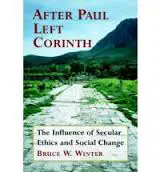

After Paul Left Corinth: The Influence of Secular Ethics and Social Change
The significance of the role that culture played in the life of the Corinthian Christians has either been ignored or underestimated in explaining the reasons for their difficulties after Paul left. Winter first examines the extent to which Paul communicated alternative ways of behaving while he was in Corinth. Winter then explores the social changes that occurred in Corinth after Paul left. Severe grain shortages, the relocation of the Isthmian Games, the introduction of a new federal imperial cult, the withdrawal of kosher meat from the official market—all of these cultural events had a substantial impact on the life of the emerging Christian community.
Accentuated with photos of relevant archaeological artifacts, this volume provides a significant new perspective from which to read Paul’s Corinthian correspondence.


